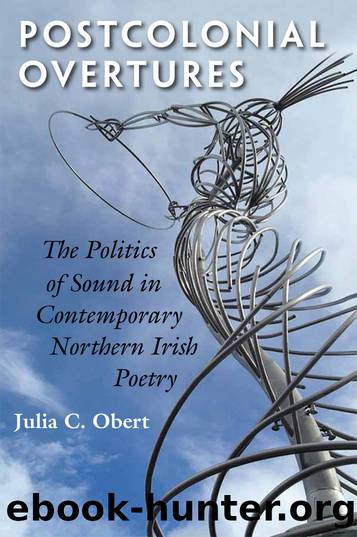Postcolonial Overtures by Obert Julia C.;

Author:Obert, Julia C.;
Language: eng
Format: epub
Publisher: Syracuse University Press
Published: 2016-02-22T00:00:00+00:00
1. Sound, of course, can also reterritorialize (e.g., national anthems sound the bounds of particular place). However, sound is often unmoored in ways that sight is not, and acoustic space is always potentially boundless: its expansive shape and scope are pregnant with the possibility of âbeing togetherâ beyond the territory.
2. Mahon has written at least one radio playâhis adaptation of The Bacchae: After Euripides aired on Raidió TeilifÃs Ãireann (RTÃ)âand the collection of his papers in the Emory archives includes pieces of others. This work suggests his vested interest in Truaxâs âshared experience of hearing.â
3. Louis MacNeice, one of Mahonâs major poetic influences, wrote radio plays for precisely this reason. MacNeice (1993, 397) claimed an attraction to the medium because it allowed an author to âtake many more liberties with time and place . . . with the help of music and recorded effectsââin other words, because audition can exceed the bounds of visual space. In his essay âMacNeice, âthe Warâ and the BBC,â Mahon (2012, chap. 14) notes the âclose relationship between MacNeiceâs poetry and radio workâ; both forms, he says, leave âintimate whispers . . . echoing somewhere in the ether.â I argue that the same can be said of Mahonâs work.
4. See Dionne Brandâs (2002) descriptions of listening to BBC radio broadcasts as a child in colonial Trinidad. âThrough the . . . broadcasts,â Brand says, â[you are] inhabited by British consciousness. . . . [On the other hand,] the ovular sound of the BBC . . . [tells] you that you are living elsewhere. . . . You have heard it described as an island. . . . You have seen on the borders of maps of islands, natives, nubile and fierce. You are living on an island, banished or uninhabited, or so it seems through the voice of the BBC. You are therefore already mythicâ (13, 17).
5. The ban was overturned in 1981 while Mahon was in the midst of composing The Hunt by Night (the volume in which âMorning Radioâ [now âRadio Daysâ] was initially collected). Paul Muldoon produced the first Irish-language radio show on BBC Northern Ireland after the injunction was lifted, and he made significant headway with bilingual programming in subsequent years.
6. The prophesy â[t]hat the world we know / is coming to an endâ (âRadio Daysâ lines 14â15), a sense of finality reinforced by Mahonâs strategically end-stopped line, is further amplified by the reverberations of historical tragedy in the poem. The sounds of âfurniture / creak[ing] and slid[ing] on the [art-deco linerâs] decksâ (lines 17â18) recall the sinking of the Titanic, a ship built in Belfastâs Harland and Wolff shipyard where Mahonâs grandfather contributed to its construction. Mahon (1991, 27) likes to indulge in the rather morbid fantasy that his grandfatherâs handiwork brought down the liner.
7. On this point, see Elmer Kennedy-Andrewsâ (2008, 174) Writing Home: âMahonâs final resting-place, as he makes clear in [Harbour Lights] concluding poem, âThe Seaside Cemetaryâ . . . is in the deterritorialized, paradoxically shifting, symbolic space of the poem itself.
Download
This site does not store any files on its server. We only index and link to content provided by other sites. Please contact the content providers to delete copyright contents if any and email us, we'll remove relevant links or contents immediately.
The Universe of Us by Lang Leav(14882)
The Sun and Her Flowers by Rupi Kaur(14373)
Adultolescence by Gabbie Hanna(8665)
Whiskey Words & a Shovel II by r.h. Sin(7839)
Love Her Wild by Atticus(7616)
Smoke & Mirrors by Michael Faudet(5986)
Wiseguy by Nicholas Pileggi(5451)
The Princess Saves Herself in This One by Amanda Lovelace(4848)
Love & Misadventure by Lang Leav(4720)
Milk and Honey by Rupi Kaur(4627)
Memories by Lang Leav(4624)
Bluets by Maggie Nelson(4342)
Too Much and Not the Mood by Durga Chew-Bose(4155)
Good morning to Goodnight by Eleni Kaur(4121)
Pillow Thoughts by Courtney Peppernell(4087)
Algedonic by r.h. Sin(3917)
The Poetry of Pablo Neruda by Pablo Neruda(3889)
HER II by Pierre Alex Jeanty(3499)
Stuff I've Been Feeling Lately by Alicia Cook(3337)
